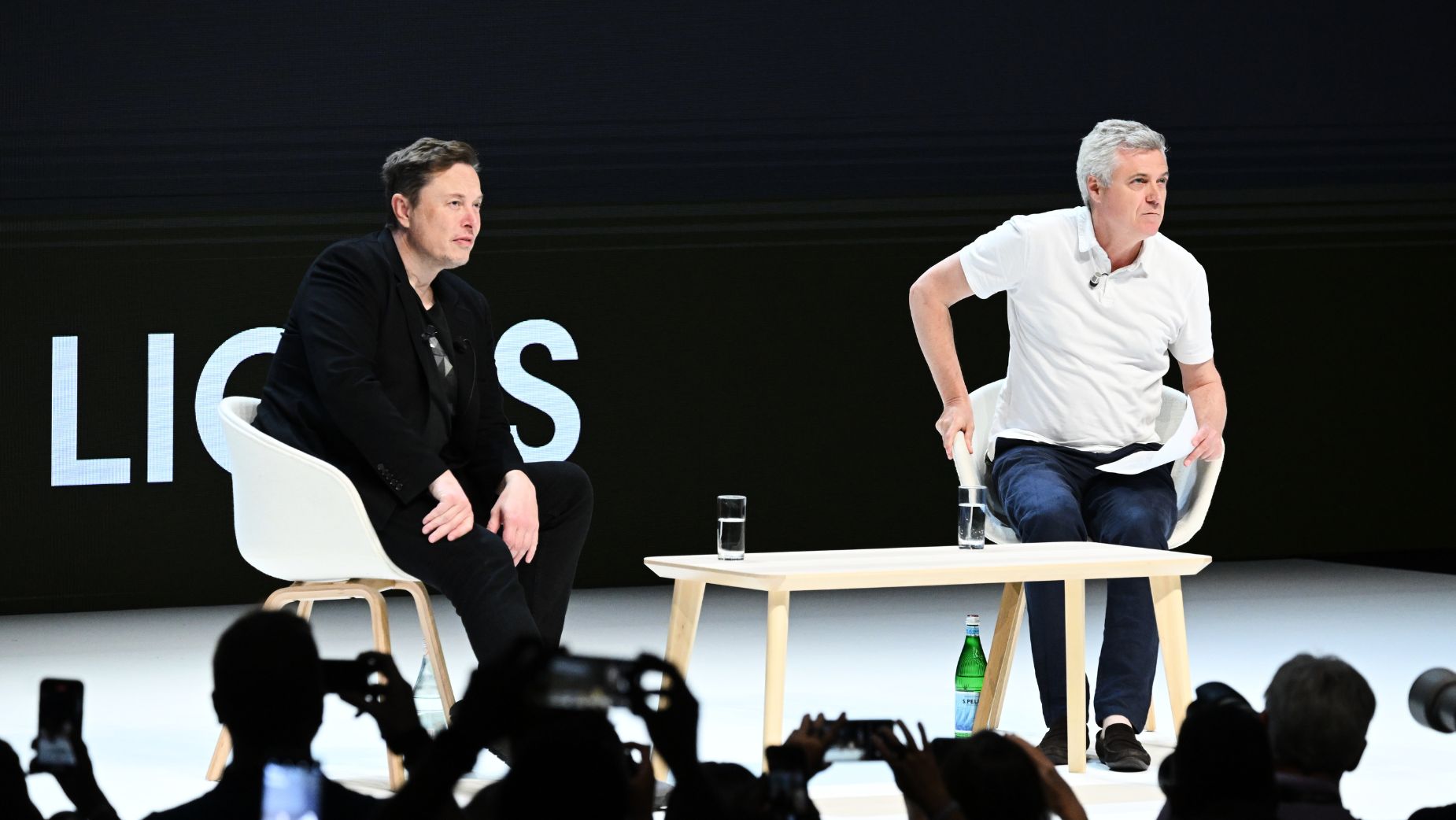
“You Told Us to Go Fuck Ourselves… Why?” Mark Read Grills Elon Musk at Cannes

It’s fair to say that Elon Musk has had a somewhat fractious relationship with the advertising and marketing industry since he took over X, the platform formerly known as Twitter. In November last year, several large brands withdrew their advertising from X after a controversial post from him. In 2019, he wrote ‘I hate advertising’ and he recently sacked the new Tesla marketing team.
So, he was a fairly spicy pick for WPP CEO Mark Read’s fireside chat at the Cannes Lions Palais – and that’s before we get to Elon’s political views and ambitious futurism that runs the gamut from Neuralink-powered cyborgs to interplanetary civilisation.
But adland’s bruised ego came first, as Mark kicked off ‘welcoming’ Elon to the heart of advertising with, “Now back in november, you had a message to us. You told us to go fuck ourselves, so maybe we start there. Why? It’s a serious question. Why did you say that?”
“First of all, it wasn’t to advertisers as a whole, it was with respect to freedom of speech,” Elon responded. “I think it is important to have a global free speech platform where people from a wide range of opinions can voice their views, and in some cases there were advertisements who were insisting on censorship. At the end of the day… if we have to make a choice between censorship and money or free speech and losing money, we’re going to pick the second. We’re going to support free speech rather than agree to be censored for money, which I think is the right moral decision.
“Now, of course, advertisers have a right to appear next to content that they find compatible with their brands. That’s totally fine. I think that’s a choice of an advertiser to appear next to content that they think fits with their brand. That’s totally cool. But what is not cool is insisting that there can be no content that they disagree with on the platform.”
Clarifying his position further he added, “I think free speech is the bedrock of democracy, and in order for X to be the public square of the world it’s really got to be a free speech platform. Now, that doesn’t mean people can say illegal things. It is free speech within the bounds of the law, but not going further than the law for a particular country. I think it’s imperative that people have a right to speak, but by the same token, advertisers have a right to appear next to content that they feel is compatible with their brand.”
That free speech can trip up Elon Musk from time to time as he admitted that ‘not every post I make is a banger’, but defends his own posts as being ‘real’.
Moving on to Elon’s thoughts about advertising itself, it seems the Tesla CEO is more interested in the short term impact of advertising rather than longer term brand building, though he did admit a soft spot for the more creatively expressive advertising.
“There’s a wide range of advertising. The usefulness of advertising varies dramatically. So, if you’re shown an ad for a product or service that you want when you want it, that is content. If you’re shown an ad for a product that you would never buy, that is spam,” he said. “So advertising hangs on how effectively it is targeted to the wants and needs of the individual [which] varies from total spam to, essentially, content. Of course I’m actually a fan of advertising that is artistically interesting, that is entertaining. Really, the acid test being, after you see the ad, do you regret seeing the ad? Did you want those seconds back from your life? Or do you think that was a really interesting ad? Sometimes, even if you’re not going to buy the product, the ad itself is so entertaining or beautiful that you, nonetheless, are happy to have seen it.”
In a bid to appeal to the advertising and marketing execs in the room, Elon laid out how advertising on X had changed. He said that ‘old school Twitter’ had negligible targeting, making it suited to only the most universal of brands like Coca-Cola or McDonald’s. These days, he said they’ve drastically improved targeting thanks to an AI-based system that can match content – whether an ad or not – with a user. There was no further questioning from Mark Read about how that targeting differs from other social platforms popular with advertisers.
When invited by Mark Read to give his pitch to advertisers thinking of returning to the platform he had this to say: “I think it’s worth trying out, and I’m interested in critical feedback. We are very focused on having ads be shown to people who would find the ad interesting. So that is something we have done, made a lot of progress on, and we will make a lot of progress on. And from a brand safety point of view, every third party reviewer has given us an A-plus on brand safety.”
He also pitched X as the platform to reach the most influential figures in business, culture and politics – those who wouldn’t be hanging out on TikTok but who are highly influential.
Having got the ad talk out the way, the conversation moved onto artificial intelligence, which Elon Musk is ambivalent about – erring on the side of optimism, he nonetheless subscribes to the probability that there’s a 10-20% chance of it going terribly wrong for humanity and an 80% chance that it results in a society of abundance for all.
He can’t say for certain which way the dice will fall, and speaks quite sincerely about the need to be mindful of AI safety, but whatever the fallout and challenges ahead, he’s excited to be living through the AI revolution. “I think we’re headed to an age of abundance. I think we’re at the most interesting time in history. You know, there’s supposedly some proverb that says ‘may you live in interesting times’ as a curse – and we live in the most interesting times. So the way I reconcile myself to a negative outcome with AI that I thought, well, let’s say even if it was the worst case scenario and we’re going to be annihilated, would I want to be around to see it? I’m like ‘probably yes’.”
Truthfulness, he explained, would be the cornerstone to AI safety, alluding to the murderous Hal 9000 in ‘2001, a Space Odyssey’ as a warning about the treacherous outcomes when AI’s are made to lie. Openness too is another important value for AI; Elon Musk was critical of the closed off direction that OpenAI (which he co-founded with Sam Altmann) had taken in pursuit of monetisation.
As for creativity, he was quite confident that AI would be able to create art and music that’s original. Urged by Mark Read to give the assembled audience of advertising creatives some hope, all he could offer was the potential that AI implants could enhance human creativity.
“That’s kind of what Neuralink aspires to do, is to enhance human intelligence so that we can keep up with AI or achieve better AI-human symbiosis,” he said. “ It will certainly amplify creativity. I think you will have a ‘magic genie’ sort of situation where if you can think of it, the AI can do it.”
He also talked at length about the impact of AI on journalism, envisioning a point where AI can aggregate millions of posts on X and synthesise stories in real time – though had less to say when Mark Read pushed back on the role of journalists to interrogate and investigate.
Looking forward, he claimed that we’d likely see some significant change in terms of the impact AI is having on our lives within a year and “very, very radical changes in five years”.
From there the conversation moved onto some of Elon Musk’s other ventures, such as Optimus, a robotic spinoff from Tesla (where he predicted that between personal robots in the home and commercial robots in factories the world could eventually see 20 billion such androids) and his ambitions for an interplanetary civilisation with SpaceX.
Reflecting on his own creativity and decision making, he said that he was plagued with ‘too many ideas’, and revealed that his own commercial choices are more human and less data driven.
“Well, I think I’m not particularly data driven in the sense that I decide on a new product based on, say, consumer surveys or something like that. I try to mentally simulate what the end customer would be like, that would want this. We don’t go and do a bunch of consumer surveys, or I don’t really ask people,” he said, drawing analogies between his path with Tesla and Henry Ford, who famously declared “If I had asked people what they wanted, they would have said faster horses.”
One area he was less interested in investing in, he said, is longevity. “I think it is important that we die at least at some point… Arguably we could live some amount longer and increase the length of time that we’re mentally and physically healthy, but if we live for too long, I think it does ossify society, there’s no changing of the leadership because leadership never dies. I mean, for a lot of people, they just don’t change their mind, they just die. So then that inhibits the new ideas.”
Signing off on an optimistic note he urged the creatives in the room – many of whom were no doubt trying to figure out how to navigate the AI transition of the next few years. “Technology will help you do anything that you want to do, and more of it. So I think we are headed to a very interesting future, the most interesting because this is the most interesting time in all of history. So enjoy the ride.”














